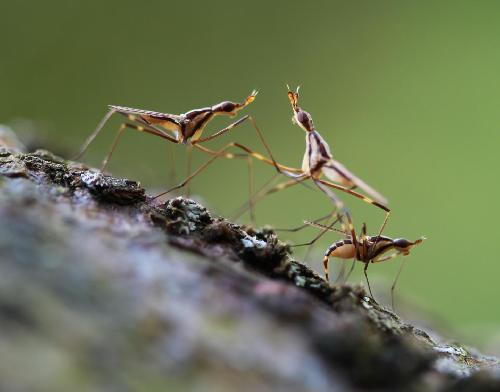For most guys in the animal kingdom, sex is a once-and-done event. Females from species like rabbits and cows get sperm from their mates and not much else. But in a Forum article published March 3 in Trends in Ecology & Evolution, researchers suggest that these limited encounters can supply resources to females in seminal fluid, and females might have evolved to seek out such seminal resources, even when the amount of fluid is small.
"Traditionally, the idea is that when this type of mating takes place, there's no resource transfer and there's no paternal care," says senior author Russell Bonduriansky, an evolutionary ecologist at the University of New South Wales (UNSW). "Males contribute DNA to fertilize an egg, but we believe there's something more complex going on."
Bonduriansky and his UNSW colleagues, Angela Crean and Margo Adler, started thinking about evolutionary preferences for seminal fluid--the liquid part of semen, minus the sperm--in 2014, while studying the offspring of female neriid flies (Telostylinus angusticollis) mated with males of varying sizes.
 This image shows a female neriid fly (Telostylinus angusticollis, lower right) laying eggs while males compete for access to her. Credit: Russell Bonduriansky
This image shows a female neriid fly (Telostylinus angusticollis, lower right) laying eggs while males compete for access to her. Credit: Russell Bonduriansky
The team found that if a male, either large or small, mated with a female fly before she was fertile, he'd pass his sperm along, but the immature eggs wouldn't be fertilized. The surprise came two weeks later: if the female neriid fly copulated with a second male once her eggs had matured and laid eggs fertilized by his sperm, the resulting offspring would be closer in size to the first male. The lingering effects appeared to stem from chemicals in the first male's seminal fluid, even though he wasn't the father.
If seminal fluid plays a critical role for future offspring regardless of the father's actual identity, says Bonduriansky, then females may have evolved to exploit the benefits. On top of situations where semen is just passing through, some female animals can store semen from multiple males before allowing any of it to fertilize their eggs, and this system could have advantages beyond holding out for the best DNA.
"Females might be choosy even when they don't have eggs ready to be fertilized," Bonduriansky explains. "They might be getting something for future offspring that will be fertilized later on, or they might be getting something for themselves."
This idea has been around for decades when thinking about pairings based on obvious resources. Female gibbons and hawks, for example, have evolved to choose males that provide food, territory, or the promise of parental care, even if they're not ready to have offspring. But, says Bonduriansky, that reasoning hasn't been applied to systems where there's nothing but a small ejaculate being transferred.
And size might not matter as much as previously thought. Seminal fluid is chemically complex, with proteins and RNA floating in the liquid outside of the sperm, so even the effects of a small ejaculate could be significant, giving females a largely unexplored bonus from sex. "It's pretty clear now that seminal fluid is packed with paternal RNA," says Bonduriansky, at least in humans, mice, fruit flies, and nematode worms. "In some systems, mostly nematodes and mice, there's evidence that these RNAs can play a role in early embryonic development," he adds, though the jury is still out on exactly what effects these molecules have.
Researchers typically think of seminal fluid in a small ejaculate as playing different roles, says Bonduriansky, but not as a resource that females purposefully seek out. "And that might not be the case."
source: Cell Press